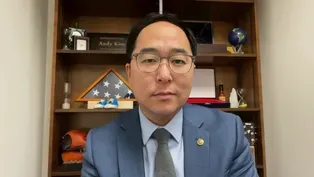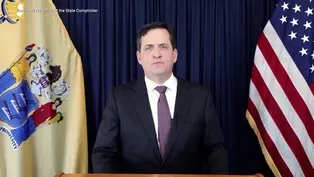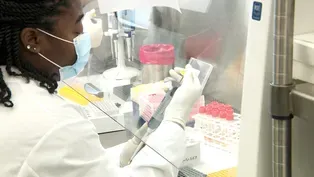NJ Spotlight News
NJ Spotlight News: February 11, 2025
2/11/2025 | 26m 46sVideo has Closed Captions
Watch as the NJ Spotlight News team breaks down today’s top stories.
We bring you what’s relevant and important in New Jersey news and our insight. Watch as the NJ Spotlight News team breaks down today’s top stories.
NJ Spotlight News
NJ Spotlight News: February 11, 2025
2/11/2025 | 26m 46sVideo has Closed Captions
We bring you what’s relevant and important in New Jersey news and our insight. Watch as the NJ Spotlight News team breaks down today’s top stories.
How to Watch NJ Spotlight News
NJ Spotlight News is available to stream on pbs.org and the free PBS App, available on iPhone, Apple TV, Android TV, Android smartphones, Amazon Fire TV, Amazon Fire Tablet, Roku, Samsung Smart TV, and Vizio.
Providing Support for PBS.org
Learn Moreabout PBS online sponsorshipANNOUNCER: major Funding for "NJ Spotlight News," provided by-- NJM Insurance Group.
Serving the insurance needs of New Jersey residents and businesses from 100 years.
And by the PSEG foundation.
RAVEN: tonight, so Andy Kim is calling that -- reckless and the Democrats willing to let the government shutdown.
>> If we are not seeing them engage in that capacity and showing as assurances that this will move forward in a way that goes away from the lushness so far from the Trump Administration, that is where we have to engage in a different tack.
Raven: Plus, New Jersey's comptroller is taking action against the owner of several nursing homes in New Jersey by cutting state Medicaid funding.
>> We have a duty to protect vulnerable residents of nursing homes of New Jersey lies that we have a duty to protect taxpayer funds.
Raven: Also, preventing avian flu.
Hackensack Meridian health is stepping up to three additional -- stepping up its mutation testing, to prevent potential outbreaks here in the state.
>> Everything we do is on behalf of the patients, so we want to discover new treatments, you know, the new ways to improve patients's quality of life.
Raven: End student success.
Finally, some school districts are seeing post-pandemic improvements in their classrooms.
>> Academic catch up efforts helped, especially those funded by federal pandemic relief dollars.
Raven: "NJSpotlightNews" starts right now.
♪ ANNOUNCER: from NJPBS Studios, this is "NJ Spotlight News" with Briana Vannozzi.
Raven: Good evening and thanks for joining us on this Tuesday night,'s sky Raven Santana info Briana Vannozzi.
First, more developments in the controversy involving Seton Hall University's new president, Monsignor Joseph Riley.
The archdiocese of Newark has lost a third party review to assess whether he acted appropriately in connection with the 2019 sex abuse scandal involving the defrocked Cardinal Theodore McCarrick.
It comes after a bum report revealed that an investigation found he was aware of the sex abuse allegations against the former Cardinal but never reported them.
This week state and federal lawmakers, including gubernatorial candidate Mikie Sherrill called for the university to publicly address the matter.
Now an external law firm hired by the diocese will review that 2019 could do much of its findings related to Seton Hall's president.
The university and Board of Regents have agreed to fully cooperate with the firm's external review.
Also tonight, more towns are pushing back against the number of affordable housing units that the state says they are on the hook to build in the next decade.
Over 100 municipalities are arguing the state has overestimated the amount of land that's open for development, according to an analysis which found that towns are a combined 14,000 acres.
Town planners say the land set aside for an housing included preserved open space, land already under development, and even flood zones.
The state as the Department of community affairs has declined to answer questions about specific disputes, but they say they came up with their assessment based on records and aerial imagery.
The state calculates New Jersey needs to build more than 80,000 new affordable units over the next decade.
But Tom says the state -- but the Tom says that state has overestimated the requirements by more than 10,000 units.
The dispute must be resolved by next month and towns have until June to formally adopt their plans.
State Attorney General Matt Platkin is wrapping up some victories.
A judge temporarily halted an effort by the White House to/federal funding for medical and public health research through the National Institutes of Health, after Plotkin and more than 20 other state Attorney General suit.
Another judge yesterday said the administration had defied his order by continuing to withhold federal funding.
Courts have also blocked Elon Musk's DOGE from accessing potentially confidential information after a suit from Attorney General Platkin and other state ages.
In an executive order challenged by New Jersey to limit birthright citizenship, has also been put on hold.
Meanwhile, Democrats in Congress are phishing attack fairly with fewer tools at their disposal to challenge his efforts to overthrow the federal government.
Now some Democrats are considering taking drastic actions.
Joining me now is New Jersey's Senator to explain.
Thank you for joining us, Senator.
Sen. Kim: thank you for heavenly.
Briana: Attorney General Matt Platkin has been leading efforts to challenge President Trump's orders in court but what, if anything, can you and your Democratic colleagues do in Washington?
Sen. Kim: first of all I am glad to see Attorney General Plotkin moving forward.
He and I have been in touch about how to be on this approach since September, in fact, we had him in a number of state Attorney General's down to the state capital -- U.S. Capitol to doctor that brought strategy.
I always tell people, look at all the range of tools we have right now.
We are working closely with him on the litigation side.
From our end making sure we are pushing forward on legislation as old as the oversight and communication aspects of that, a lot that we are pushing back on red comes to these nominations for the Trump Administration.
You know, I was speaking on the floor of the Senate in the middle of the night raising concerns in an effort to be able to push on one of the west of the nominees -- Russell Vought -- raising up that profile.
Those are the actions we need to make sure we are doing.
And just yesterday I did a telephone town hall and well over 1000 people were on that, making sure we are explaining what is happening, the threat and the concern to communities lies of bringing together roundtables of organizations across New Jersey to really pass that home.
Those are the actions we need to be continuing and growing.
Briana: Yes, you are continuing those actions.
You center this weekend on NBC that you are open to shutting down the government to try to stop the White House's efforts to dismantle federal agencies.
How?
Sen. Kim: I want to set the record straight here, because it is the Republicans that have the White House, the majority, the house, as well as the Senate.
They could very well push forward without Democrats.
We have seen that in how they have been moving forward with some of these nominees.
The west of them, as we have seen get through, like Pete Hegseth.
So, our effort here is to try to engage and say, hey, look, Republicans on this process.
I don't want to see a shutdown.
I was a government employee and career public servant.
I worked through multiple shutdowns.
It's not at all what the American people want, and what we're seeing now is Trump's effort to basically already shut down the government -- not only shut it down, but try to dismantle large parts of it.
I really hope the American people understand and see what is happening on that front.
And when it comes to the government funding process going forward, I just talked with my colleagues we waiting to see if Republicans are going to seek efforts to renegotiate in a bipartisan way.
But if we are not seeing them engage in that capacity and not showing as assurances that this will go away from the lawlessness we have seen so far from the Trump Administration, that is when we have to engage in a different tactic.
Raven: Is that the only way you think congressional Democrats can push back?
Sen. Kim: no, there are lots of ways we are trying to maneuver.
I was pointing out that way because that is something we are coming up -- something coming up in a matter of weeks.
There are other steps we can try to push on.
On the side side, the confirmation hearings front-and-center, and that is one of our best ways to hit home until the American people what is happening.
On top of that stock as someone who, my very first job in government was at USAID, which the Trump Administration has been trying to dismantle over the course of last week, the efforts that I took to go to the USAID building to draw attention to this, not only to the press, but to be able to engage --, actually, tomorrow I will be meeting with a number of former USAID officials to highlight this publicly.
But I am also engaged directly with current USAID officials.
That helps me get a sense of what is happening beyond the scenes, and we can use that for litigation, as well as legislation and oversight capabilities.
Those are the tools we are bringing together.
Raven: Do you think Republicans would be willing to negotiate?
Guest: We will see.
I mean, this is something where they have made the Democratic votes for every other continuing resolution or budget process over the last two years.
They have I think one vote to spare on the House of Representatives side right now.
They have a number of people on that side that are very defined, you know, and they were trying to stand in a way of Speaker Johnson B, a speaker again.
So they have a very hard time navigating on their own.
They have never been able to do that before with just their own votes.
So, this sense of they need to have Democratic votes, the question then is, what are they going to bring to the table?
What assurances can they bring?
Raven: You have mentioned that you have been holding roundtables in town halls this week to hear how these executive orders are actually affecting people, what are you actually hearing?
Sen. Kim: first of all, the effects of federal employees are not just down in Washington, D.C., we have employees in New Jersey worried about that.
And the funding freeze of the administration try to take would affect huge swaths of community organizations and leaders.
I have this one leader of our town hall last night that works on disability issues, trying to help New Jersey and have disability.
She was saying that these organizations, centers around New Jersey, they only have enough funding for about a couple of weeks really.
50, 60 days at most.
So, any type of funding freeze that could be three or five months or longer, would actually be catastrophic, and these centers for people with physical disabilities and challenges that need the care, they can't be put on pause.
Raven: Do you think we have reached a constitutional crisis?
Sen. Kim: I think we're just about there.
We are seeing a breaking of the law and now we have these judicial efforts underway.
What worries me most is we saw the vice president, you know, publicly say online that he thinks that these judges are going too far.
That there are questions about whether or not they need to be listened to.
That's when we are getting into a constitutional crisis, if we see the defiance of the executive branch not engaging in an order from a coequal branch of government, the judiciary, which has been how we have been able to settle these disputes in the past.
Right now we have in the legislature, as I said,'s lead by Republican Senate and Republican House, that are just totally fine abdicating their responsibility and their power.
We see that with the nominations when they say oh, we just have to vote on everyone from foot forward -- then why do we have a constitutional right to advise and consent to start with?
Why are we just handing that over?
Briana: Thank you, Senator Kim for having us.
New Jersey's comptroller is taking more action to prevent fraud within nursing homes in the state.
The latest announcement targets 4 facilities, bettering them for treating Medicaid patients and -- barring them from treating Medicaid patients and receiving Medicaid funding.
It comes after the seat was pleaded guilty to conspiracy related to their nursing homes in Wisconsin.
Senior correspondent Brenda Flanagan looks at what will happen to people living in these 4 New Jersey facilities, and been a troubling trend of fraud that illustrates nursing homes.
Reporter: 4 nursing homes in North Jersey face closure if the current owner doesn't sell them in three months.
That's Kevin Breslin of Hoboken who pleaded guilty to fraud or diverting federal funds in his Wisconsin facilities, leaving nursing home residents are without basic care.
Jersey watchdogs took notice.
>> we have a duty to protect vulnerable residents of nursing homes in New Jersey and we have a duty to protect taxpayer funds.
Reporter: state comproller Kevin Walsh threatened to suspend Medicaid dollars unless the Avalon and Atrium care centers in Wayne, and two more yttrium centers in Park Ridge are sold , by Breslin and co-owners W SCH -- noting again and again, we are seeing owners and operators of Medicaid funded nursing homes in New Jersey engaging in massive fraud.
>> we got really lucky that we were able to piggyback off of what happened in Wisconsin and make sure that these operators -- of those orders will no longer be doing business.
>> nobody, I hope, would argue that someone who has been convicted of a crime in another state related to their activities as a nursing home owner or operator, should be allowed to operate and got Medicaid funds, to get public funds in the state of New Jersey.
Reporter: New Jersey's long-term care ombudsman uploaded the comptroller as quote recent actions to hold New Jersey nursing home owners accountable.
Walsh ordered a similar sale at last month by owners of South Jersey extended care in Bridgeton, and Sterling Manor in Maple Shade, after uncovering alleged fraud.
Sterling closed abruptly last month.
>> These residents had some inkling they were going to have to leave in a few weeks, but all the discharge planning was not complete for these residents, so at the end of the day it looked like an emergency evacuation on a Friday night in January in the bitter cold.
>> This is a symptom of a systematic failure, and it's a failure to people who are expecting a level of care.
A level of safety, whose families are expecting that they are receiving the care that taxpayers are paying for it to the tune of about $2 billion every single year.
Reporter: Our guest from the AARP sites that industry as quote lack of transparency.
nursing homes can change owners or change names and it's often difficult to to track funding without expensive forensic audits.
A Senate bill would require more disclosure, but industry lobbyists call it an unfunded mandate.
The ombudsman wonders about operators who work the system.
>> what I would say is that there is a playbook for some of these guys.
And what it involves is cut corners, cut corners, cut corners.
Don't use the best housekeeping products.
don't supply the best food, don't supply additional snacks, don't, you know, go on the cheap.
A big one is, under staff intentionally.
And if you get caught, pay the fine, it's the cost of doing business.
Reporter: Kevin Breslin was unavailable for comment.
He has until May 7 to sell his New Jersey nursing homes.
The state is reviewing ownership applications for three facilities and a management contract for the fourth.
I'm Brenda Flanagan, NJ Spotlight News.
Raven: As public health experts raise concern over the spread of avian flu one New Jersey health system is wasting no time taking steps to track and test for it.
So far there are no human cases reported in the state to admit the virus has been detected in wild birds in New Jersey.
Hackensack marriage and health is using advanced testing to better understand avian flu and its emerging mutations.
Ted Goldberg got a firsthand look at how the testing works, and how the research could prevent future outbreaks.
>> Everything we do is on behalf of the patients, so we want to discover new treatments, new ways to improve patients' quality-of-life.
In any researchers at the Center for discovery and innovation can see the bird flu virus, but they can run tests on it and see the dead cells left in its wake.
This work is done under a ton of protection, with DPE -- PPE that has to be depressurized and insulated afterwards.
>> It allows us to work with the virus without releasing the vast outside.
>> it is pumping in positive air so that if she has an exposure, she would never have a direct contact with the virus.
Reporter: The doctor is that chief scientific officer at the center in Nutley which is looking into ways to fight them bird flu that has killed millions of egg-laying chickens this year.
>> We in fact and then we start treating with drugs to see which drugs will prevent the virus from having its psychopathic effect.
Reporter: There are around 70 human cases nationwide, but man in New Jersey at.
>> A lot of this equipment is for molecular analysis of pathogens, whether bacterial, fungal, or viral.
Reporter: Researchers are testing food samples from hospital patients within the Hackensack Meridian health system that aren't your garden-variety type a flu.
There have been a 30 atypical flu cases but none are bird flu so far.
>> Here they are taking the samples, processing them so they can then isolate the nucleic acid, which weekend I need for sequencing.
>> Once we receive the verses we do the sequencing, we look for new mutations that can cause this resistance.
>> If it is an age five, do we have For example, mutations that are indicative of human transmission.
Reporter: H5N1 is the word from bird flu.
The technology is similar to what was used to a D COVID.
>> At the peak of the pandemic, we were getting hundreds if not thousands of virus samples in the week and we didn't have time to be able to use high throughput sequencing to be able to.
Hey, it's too expensive and B, it is too time-consuming.
So we needed a more rapid analysis.
Reporter: That rapid analysis was built from back in the research going back to previous outbreaks of diseases like anthrax and SARS.
Reporter: In the early part of the pandemic, when we saw what was happening in China and Europe, to be able to develop our own tests.
Having been able to develop with other groups, FDA-approved diagnostics, we are able to incorporate those principles rapidly.
Reporter: The virus that causes bird flu isn't new, but this year's outbreak has been particularly virulent, resulting in egg prices jumping.
>> The H5N1 virus is very pathogenic in birds and, especially chickens and ducks so once we are seeing a we are losing the, animals, but also their egg laying capacity.
Reporter: This is an associate professor of medicine and pediatrics at Rutgers, he says most people shouldn't worry about contracting bird flu unless there is a serious mutation, which is always a risk with viruses.
>> These cases have at this point, been confined almost exclusively to people that had occupational contact with the virus, so they were caring for birds and flocks who wound up infected W.A.R.
were dairy workers and the cows got infected.
Reporter: Bird flu can also infect dairy cattle.
The doctor says the virus is killed or deactivated by pasteurized milk, and there are no reported cases in poultry or cattle statewide.
A state data says more than a hundred world birds have more than likely died from the bird flu this season and scientists are hard at work to limit the damage from the virus going forward.
In Nutley, ted Goldberg, NJ Spotlight News.
Raven: Finally some good news for New Jersey when it comes to education, a newly released shows that 9 low income school district in the state are performing above pre-pandemic achievement levels in math and reading.
This comes after New Jersey had among the biggest drops in math performance for low income students, according to researchers at Harvard and Stanford.
So what contributed to the improvement, and how does that compare to other districts?
For that and more, I am joined by our education and Chad Wolf your writer, Hannah Gross.
Thanks for being with me.
Guest: Thank you so much for having me.
Raven: First let's break down what districts saw improvement, and in what subjects.
Guest: One district to highlight is Union City, which researchers out of the 11 thousand districts they studied, they named it one of 8 district success stories and how they overcame those pandemic gaps in both reading and math.
Some of the other low-income districts that I spoke to work Beverly City where they improved in math.
Also think it would in reading, at -- Inglewood in reading.
Other schools as well.
Raven: When we think about this improvement, how much are we talking about when I think back to that pre-pandemic level, and then now?
Guest: The research looked from 2019 to 2024, and the biggest improvement was about half a grade level's worth of knowledge.
Some of the smaller ones were maybe two tents one-third.
Raven: And what key factors did you find during your reporting that contributed to this performance levels increasing?
Guest: One of the biggest things, after speaking with superintendents and also the researchers will lead the project was that academics catch up efforts helped especially ones funded by the federal pandemic release dollars.
So that is any extra instructional time of, whether tutoring during the school day, before or after school, adding in programming on Saturdays or maybe doing a summer at learning academic where there could be extra remediation and intervention efforts.
Raven: What other programs did we see that really aided with all this improvement, because in addition to those types of programs, I I saw in the report there was tutoring and summer school.
Can we highlight those initiatives?
Guest: One thing is high-impacts tutoring, which is in New Jersey we focus on third and fourth graders.
We had a state grant that particularly funding this, small group tutoring with maybe three or four students.
Some districts had their own teachers be the tutors, they know the students, they know what their needs are.
Many districts also partnered with the tutoring companies as well.
Raven: We know that this is good news, and it seems that they are obviously up to speed.
But is there still more work that needs to be done?
Guest: Of course, there is more work that needs to be done.
I mean, this is 9 districts.
There are five or so districts that aren't low income that also are considered fully recovered by the researchers.
But that is 15 districts and there is almost 600 in New Jersey.
So, there is still work to be done.
There is a huge gap separating students based on income in the community and your family and also based on race, that need to be closed as well.
Raven: So we know that the Trump Administration is threatening to cut federal funding.
How will his programs -- will these programs continue when we know that they work?
Guest: The federal pandemic release funds have about dried up and I'll bet there are other funding sources.
The researchers recommend that the programs that are working, districts find other ways to pay for them.
So suck it whether it is title I funding which held high-poverty school districts, or money that is part of the general fund coming from state and local taxes.
Raven: Hannah, thank you so much for joining me.
If you'd like to hear more and see more of her reporting, you can go to NJspotlightnews.org.
Thank you so much.
That will do it for us tonight.
Before you go, a reminder, you can download the NJ Spotlight News podcast three, and to us in a I'm Raven Santana.
Further entire NJ Spotlight News team, thanks for being with us.
Have a great night and we'll see you back here tomorrow night.
♪ ANNOUNCER: New Jersey Education Association.
Making public schools break for every child.
RWJ Barnabas Health.
Let's be healthy together.
And, Arsted, committed to delivering clean, reliable American-made energy.
♪
9 low-income NJ school districts exceed pre-COVID test scores
Video has Closed Captions
Interview: Hannah Gross, education and child welfare writer, NJ Spotlight News (4m 23s)
Kim describes 'range of tools' against Trump's efforts
Video has Closed Captions
Interview: U.S. Sen. Andy Kim (8m 58s)
NJ comptroller orders 4 nursing homes to be sold
Video has Closed Captions
The owner pleaded guilty in Wisconsin health care fraud case (4m 10s)
NJ scientists researching the spread of bird flu
Video has Closed Captions
Bird flu not yet reported in New Jersey’s dairy cattle or poultry (4m 50s)
Seton Hall president’s actions on McCarrick under review
Video has Closed Captions
Law firm to review whether Monsignor Joseph Reilly ‘acted appropriately’ (1m 5s)
Providing Support for PBS.org
Learn Moreabout PBS online sponsorship















